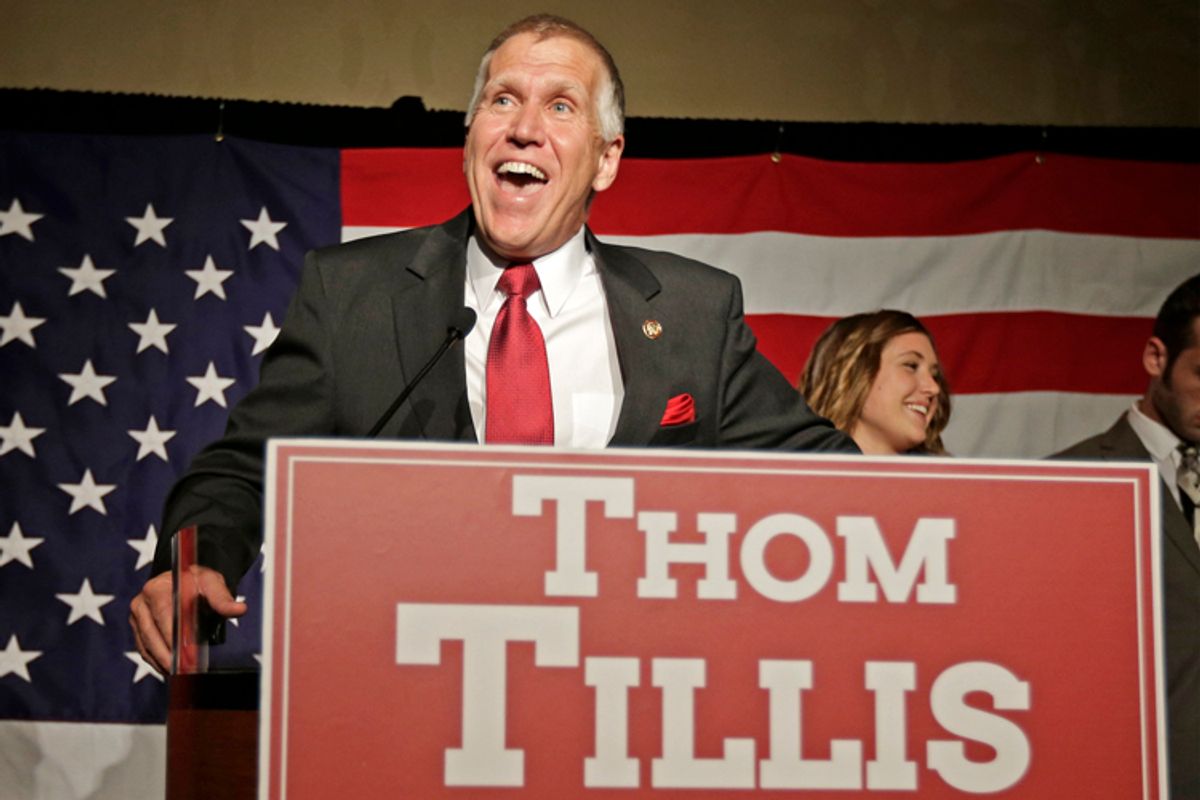History may ultimately remember GOP Senate candidate Thom Tillis as one of the only Republicans in North Carolina history to serve as speaker of the House. And if he manages to defeat Sen. Kay Hagan this November, history may ultimately remember Tillis as a bona fide member of the United States Senate. But while history's verdict is still to be determined, my estimation of Thom Tillis is already set. Simply put, he's the (despicable) gift that keeps on giving.
By the second time Tillis made news by giving voice to the base of the Republican Party's reactionary id — first for promoting a "divide and conquer" strategy to attack recipients of government support; then for contrasting African Americans and Latinos in North Carolina with the state's "traditional population" — I was beginning to have my suspicions. But a recent report on a 2007 statement in which Tillis claims a "subset" of the state's Democrats ceaselessly call for "de facto reparations" is the clincher.
In this instance and others, what makes Tillis so valuable is the way his previous statements show what it sounds like when an ultra-conservative tries to reach his fellow travelers by using language intended to signal his membership within (and loyalty to) the tribe. Indeed, as was the case during both his "divide and conquer" gaffe and his "traditional population" slip, the Tillis we see attacking "de facto reparations" is on the defensive, trying to prove to his far-right audience that he's still on their team. And everyone on that team, to state the obvious, just so happens to have white skin.
In fact, once you learn about the specific context of Tillis's reparations remark, the connection between the U.S. far-right's hatred for redistribution and its negative views of non-white citizens becomes even clearer. According to the report, Tillis's statement was an attempt to persuade his most conservative supporters that the legislature's apology would not pave the way for reparations, which was apparently their concern. "This resolution acknowledges past mistakes and frees us to move on," Tillis assured these right-wingers, trying to spin the apology as a way to put the debate over racism and slavery's legacy finally to rest.
Guarding against the possibility that his support for the apology be interpreted as a sign of a more fundamental disagreement with the Republican base, Tillis then endorsed the redistribution-is-reparations argument in general, claiming that a "subset" of Democrats "has never ceased to propose legislation that is de facto reparations." All this despite the fact that, according to Tillis, "Federal and State [sic] governments have redistributed trillions of dollars of wealth over the years by funding programs that are at least in part driven by [the subset's] belief that we should provide additional reparations." And there you have it, according to Tillis: modern liberalism itself is little more than an elaborate excuse for giving money to blacks.
For people inclined to see most of U.S. politics as heavily influenced by the country's shameful history on race — a group amongst which I count myself — Tillis's argument, his conflation of redistribution and race, couldn't have been more revealing. Yet for those who are not conservative but are still sometimes uncomfortable ascribing so much of our politics to the consequences of race, there may be a temptation to assume Tillis's argument, while undeniably racialized, has more to do with the ways Republicans have gone backwards on race during the Obama era. But let's remember: Tillis's comments came in 2007, before there was a President Obama, before there was Obamacare and before conservative media began talking about reparations as a matter of course.
So Tillis's latest flub isn't about Obama, specifically. Instead, it tells us something essential about the conservative movement today as a whole. Namely, that despite what self-styled centrist pundits and Republican Party leadership may tell you, the debate over the welfare state and redistribution — which has once again come to dominate American politics, and is likely to continue to do so into the foreseeable future — is, especially for hardcore conservatives, a debate about tribal belonging and race. Former Speaker of the House Tip O'Neill famously said that all politics is local; if I could tweak the phrase for the current era, I'd say that when it comes to American politics, all redistribution is racial.



Shares